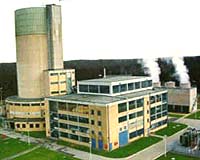 |
Vilnius (AFP) Sept 30, 2009 Lithuania said Wednesday it aimed in the first six months of 2010 to sign a key investment deal in a four-nation nuclear power project to replace a Soviet-era plant set to shut down within months. "The plan is to sign a contract with the strategic investor in the first half of 2010," Energy Minister Arvydas Sekmokas told reporters, referring to the as-yet unchosen player that will steer the construction. "It's still a provisional date, however, because talks are still under way with our regional partners, Latvia, Estonia and Poland, and the negotiations with the strategic investor will depend on those talks," Sekmokas cautioned. Lithuania is home to a Soviet-era power station near Ignalina in the east of the country, similar in type to the one that exploded at Chernobyl in Ukraine in 1986, the worst-ever nuclear power accident. Vilnius pledged to close the Ignalina plant by December 31, 2009 as part of the terms of its admission to the European Union in 2004. The original target for opening the new plant was 2015, but Vilnius later warned of a delay until 2018. Some experts have said 2020 is more likely, but project director Sarunas Vasiliauskas said others saw 2018 was "not unrealistic, just ambitious." The drive has been dogged by discord among the four countries involved. Poland argues that, with a population of 38 million compared to the combined seven million in its three Baltic partners, it deserves a big slice of the electricity. One of Ignalina's reactors was shut in December 2004 and Lithuania is worried about a looming power shortfall because the plant provides the bulk of its electricity. Construction costs for the new 3,200-megawatt plant are expected to be at least three to five billion euros (4.4 to 7.3 billion dollars), according to a study released at Wednesday's press conference. The report -- the bulk of which remains confidential -- was produced by the investment bank N M Rothschild & Sons and said that the power plant project was "attractive from a commercial point of view and achievable." It also said that foreign investment tied to the project would provide an economic boost for Lithuania -- which is currently locked in a deep recession after its economic boom went bust. Vasiliauskas indicated that seven players could be in the running for the contract to build the plant: Swedish energy group Vattenfall, Germany's RWE and E.ON, France's Suez-GDF and EDF, Italy's Enel and Spain's Iberdola. The Lithuanian nuclear project is one of a plethora in the region. Poland plans to build its first plant by 2020, Russia has launched a drive to construct one by 2016 in its Baltic enclave of Kaliningrad, sandwiched between Poland and Lithuania, and Belarus is also planning one by 2016. The moves have sparked protests by environmentalists. In Lithuania Wednesday, campaigners filed a lawsuit, seeking to have the construction permit withdrawn. Share This Article With Planet Earth
Related Links Nuclear Power News - Nuclear Science, Nuclear Technology Powering The World in the 21st Century at Energy-Daily.com
 Germany eyes nuclear revival
Germany eyes nuclear revivalBerlin (UPI) Sep 28, 2009 Nuclear energy is set to be revived in Germany as Chancellor Angela Merkel can form her coalition of choice after this Sunday's elections. Merkel's center-right Christian Democratic Union and the pro-business Free Democratic Party were in coalition negotiations Monday; a government will be formed within the next four weeks, the chancellor said. With the CDU and the FDP both ... read more |
|
| The content herein, unless otherwise known to be public domain, are Copyright 1995-2009 - SpaceDaily. AFP and UPI Wire Stories are copyright Agence France-Presse and United Press International. ESA Portal Reports are copyright European Space Agency. All NASA sourced material is public domain. Additional copyrights may apply in whole or part to other bona fide parties. Advertising does not imply endorsement,agreement or approval of any opinions, statements or information provided by SpaceDaily on any Web page published or hosted by SpaceDaily. Privacy Statement |